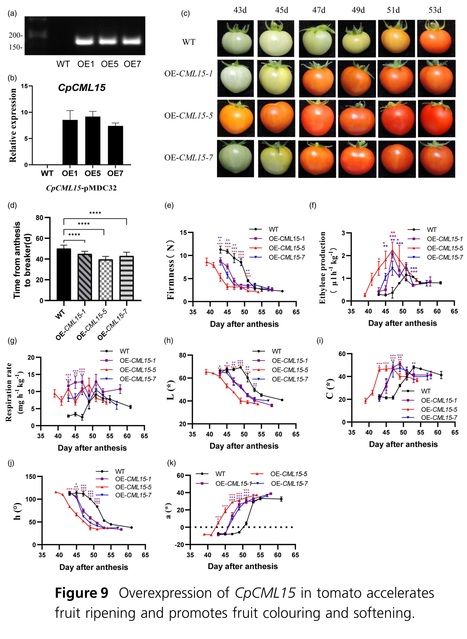 Your new post is loading...
 Your new post is loading...
Authors: Qiunan Zhu, Qinqin Tan, Qiyang Gao, Senlin Zheng, Weixin Chen, Jean-Philippe Galaud, Xueping Li and Xiaoyang Zhu.
Plant Biotechnology Journal (2024)
Abstract: "It is well known that calcium, ethylene and abscisic acid (ABA) can regulate fruit ripening, however, their interaction in the regulation of fruit ripening has not yet been fully clarified. The present study found that the expression of the papaya calcium sensor CpCML15 was strongly linked to fruit ripening. CpCML15 could bind Ca2+ and served as a true calcium sensor. CpCML15 interacted with CpPP2C46 and CpPP2C65, the candidate components of the ABA signalling pathways. CpPP2C46/65 expression was also related to fruit ripening and regulated by ethylene. CpCML15 was located in the nucleus and CpPP2C46/65 were located in both the nucleus and membrane. The interaction between CpCML15 and CpPP2C46/65 was calcium dependent and further repressed the activity of CpPP2C46/65 in vitro. The transient overexpression of CpCML15 and CpPP2C46/65 in papaya promoted fruit ripening and gene expression related to ripening. The reduced expression of CpCML15 and CpPP2C46/65 by virus-induced gene silencing delayed fruit colouring and softening and repressed the expression of genes related to ethylene signalling and softening. Moreover, ectopic overexpression of CpCML15 in tomato fruit also promoted fruit softening and ripening by increasing ethylene production and enhancing gene expression related to ripening. Additionally, CpPP2C46 interacted with CpABI5, and CpPP2C65 interacted with CpERF003-like, two transcriptional factors in ABA and ethylene signalling pathways that are closely related to fruit ripening. Taken together, our results showed that CpCML15 and CpPP2Cs positively regulated fruit ripening, and their interaction integrated the cross-talk of calcium, ABA and ethylene signals in fruit ripening through the CpCML15-CpPP2Cs-CpABI5/CpERF003-like pathway."
Authors: Kenan Jia, Wei Wang, Qing Zhang and Wensuo Jia.
International Journal of Molecular Sciences (2023)
Abstract: "Plant cell walls are essential structures for plant growth and development as well as plant adaptation to environmental stresses. Thus, plants have evolved signaling mechanisms to monitor the changes in the cell wall structure, triggering compensatory changes to sustain cell wall integrity (CWI). CWI signaling can be initiated in response to environmental and developmental signals. However, while environmental stress-associated CWI signaling has been extensively studied and reviewed, less attention has been paid to CWI signaling in relation to plant growth and development under normal conditions. Fleshy fruit development and ripening is a unique process in which dramatic alternations occur in cell wall architecture. Emerging evidence suggests that CWI signaling plays a pivotal role in fruit ripening. In this review, we summarize and discuss the CWI signaling in relation to fruit ripening, which will include cell wall fragment signaling, calcium signaling, and NO signaling, as well as Receptor-Like Protein Kinase (RLKs) signaling with an emphasis on the signaling of FERONIA and THESEUS, two members of RLKs that may act as potential CWI sensors in the modulation of hormonal signal origination and transduction in fruit development and ripening."
|
Authors: Yaxiu Xu, Zhi Liu, Tianxing Lv, Yun Wei, Weiting Liu, Yajing Wei, Guangxin Yang, Li Liu, Tong Li and Aide Wang.
Plant Physiology (2023)
Abstract: "Ethylene biosynthesis in apple (Malus domestica) fruit can be suppressed by calcium ions (Ca2+) during storage; however, the underlying mechanisms are unclear. In this study, we identified the apple transcription factor MCM1-AGAMOUS-DEFICIENS-SRF5 (MdMADS5), which functions as a transcriptional activator of the ethylene biosynthesis-related gene 1-AMINOCYCLOPROPANE-1-CARBOXYLIC ACID SYNTHASE1 (MdACS1), a partner of the calcium sensor CALCIUM-DEPENDENT PROTEIN KINASES7 (MdCDPK7). Ca2+ promoted the MdCDPK7-mediated phosphorylation of MdMADS5, which resulted in the degradation of MdMADS5 via the 26S proteasome pathway. MdCDPK7 also phosphorylated 1-AMINOCYCLOPROPANE-1-CARBOXYLIC ACID OXIDASE1 (MdACO1), the key enzyme in ethylene biosynthesis, leading to MdACO1 degradation and inhibition of ethylene biosynthesis. Our results reveal that Ca2+/MdCDPK7–MdMADS5 and Ca2+/MdCDPK7–MdACO1 are involved in Ca2+-suppressed ethylene biosynthesis, which delays apple fruit ripening. These findings provide insights into fruit ripening, which may lead to the development of strategies for extending the shelf life of fruit."
Authors: Tong Li, Zhi Liu, Tianxing Lv, Yaxiu Xu, Yun Wei, Weiting Liu, Yajing Wei, Li Liu and Aide Wang.
Plant Physiology (2023)
Abstract: "The plant hormone ethylene plays a central role in the ripening of climacteric fruits, such as apple (Malus domestica). Ethylene biosynthesis in apple fruit can be suppressed by calcium ions (Ca2+); however, the underlying mechanism is largely unknown. In this study, we identified an apple APETALA2/ETHYLENE RESPONSIVE FACTOR (AP2/ERF) transcription factor, MdCYTOKININ RESPONSE FACTOR4 (MdCRF4), which functions as a transcriptional activator of ethylene biosynthesis- and signaling-related genes, including Md1-AMINOCYCLOPROPANE-1-CARBOXYLIC ACID SYNTHASE1 (MdACS1) and MdETHYLENE RESPONSIVE FACTOR3 (MdERF3), as a partner of the calcium sensor, calmodulin (MdCaM2). Ca2+ promoted the Ca2+/CaM2-mediated phosphorylation of MdCRF4, resulting in MdCRF4 recognition by the E3 ubiquitin ligase MdXB3 ORTHOLOG 1 IN ARABIDOPSIS THALIANA (MdXBAT31), and consequently its ubiquitination and degradation via the 26S proteasome pathway. This in turn resulted in lower expression of MdACS1 and MdERF3 and reduced ethylene biosynthesis. Transiently overexpressing various MdCRF4 proteins with specific mutated phosphorylation sites revealed that the phosphorylation state of MdCRF4 affects the ripening of apple fruit. The results reveal that a Ca2+/CaM-MdCRF4-MdXBAT31 module is involved in Ca2+-suppressed ethylene biosynthesis, which delays apple fruit ripening. This provides insights into fruit ripening that may result in strategies for extending fruit shelf life."
|




 Your new post is loading...
Your new post is loading...









